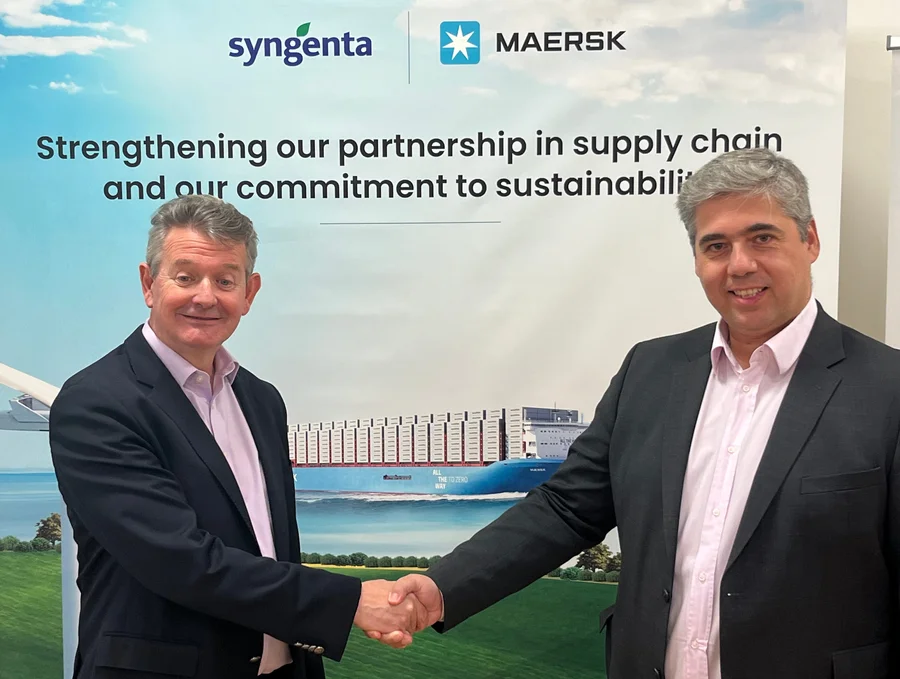Syngenta Crop Protection, a global leader in agricultural innovation, and Maersk, the shipping and logistics giant, have extended their 4PL partnership.
In a move underscoring growing emphasis on responsible logistics and supply chain optimisation, Syngenta Crop Protection, a global leader in agricultural innovation, and logistics giant Maersk have extended their 4PL partnership.
The five-year renewal of their collaboration is a testament to both companies’ unwavering commitment to sustainability and their shared vision of developing cutting-edge solutions that streamline supply chains while reducing environmental impact.
Simplifying supply chains through 4PL
Maersk, a global leader in shipping and logistics services with more than 100,000 employees and a presence in 130 countries, is actively working towards its ambitious goal of reaching net-zero emissions across its entire business by 2040.
This commitment to sustainability is a key element of the company’s Logistics & Services product offering, as it aims to provide customers with leading supply chain management solutions from factory to final destination.
As a 4PL provider, Maersk takes third-party logistics a step further by managing resources, technology, infrastructure and other logistics providers to design, build and deliver customised supply chain solutions for Syngenta.
This holistic approach enables the partners to unlock new levels of efficiency and responsiveness.
“We thrive by the success of our customers and contribute to this by developing solutions that optimise and simplify their supply chains,” says Dimitris Armenakis, Global Head of Managed by Maersk Product. “We’re always looking to innovate on behalf of our customers and add further value to their businesses.”
Driving innovation and sustainability
Syngenta, a pioneer in agricultural innovation, is undoubtedly aligned with Maersk when it comes to dedication to sustainability and continuous improvement.
“We’re thrilled to extend our partnership with Maersk, a company that shares our commitment to sustainability and innovation,” says Mike Hollands, Global Head of Production and Supply at Syngenta Crop Protection.
The close bond between the two companies in prioritising sustainability and driving innovation has been a cornerstone of their successful collaboration.
“Our partnership has proven its value and we look forward to achieving new milestones together by continuing to develop and implement cutting-edge solutions that optimise our supply chains, leveraging digital logistics and artificial intelligence,” Hollands adds.
A key focus area for Maersk and Syngenta is their constant pursuit of more sustainable logistics.
Both companies have made sustainability a top priority, with Maersk aiming to achieve net-zero greenhouse gas (GHG) emissions by 2040 and Syngenta accelerating its efforts to decarbonise operations and set clear targets for sustainable practices.
Under their partnership, regular reporting on emissions and ongoing dialogue on sustainability outcomes are crucial determinants of business performance, ensuring that both parties remain accountable and focused on their environmental objectives.
Navigating disruption
The past eight years have been marked by major disruptions, including the COVID-19 pandemic and the Red Sea crisis, which have tested the resilience of global supply chains.
However, Syngenta and Maersk have successfully navigated these challenges thanks to their enhanced resilience and ability to identify opportunities to reduce GHG emissions in Syngenta’s supply chain.
“The journey we are on together with Syngenta underpins Maersk’s position as an integrated logistics provider,” continues Dimitris.
This renewed partnership between Syngenta and Maersk reinforces their shared commitment to sustainability and innovation, solidifying their positions as industry leaders driving efficient, resilient, and environmentally-responsible supply chain solutions.
As the world continues to grapple with the challenges of climate change and supply chain disruptions, the collaboration between these two powerhouses serves as a shining example of how strategic partnerships can pave the way for a more sustainable and innovative future in the logistics industry.



